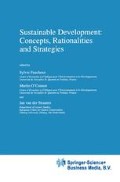Abstract
Solutions to environmental problems are clearly related to the way these problems are conceived, i.e. how the roots of the problems are understood. Traditional neoclassical economics explains the roots of environmental problems as market failure. In the case of collective goods, these failures are due to difficulties in establishing markets, while in the case of negative externalities, the failures are due to a lack of well-defined property rights that might otherwise be a foundation for establishing markets. The Coase solution to environmental problems would be to determine property rights as a basis for negotiations between involved parties, but because of transaction costs and several other real world problems this would only rarely be applicable. Suggestions have thus mainly concentrated on the estimation of optimal pollution and the use of either tariffs or tradeable permits to ensure this level.
Access this chapter
Tax calculation will be finalised at checkout
Purchases are for personal use only
Preview
Unable to display preview. Download preview PDF.
References
Daly, H.E. and Cobb, J.B. (1989) For the Common Good, Beacon Press, Boston.
Daly, H.E. (1992) Allocation, distribution, and scale: towards an economics that is efficient, just, and sustainable, Ecological Economics 6, 185–193.
Dosi, G., Freeman, C., Nelson, R., Silverberg, G. and L. Soete (eds.), (1988) Technical Change and Economic Theory, Pinter Publishers, London.
Dragun, A.K. (1983) Externalities, property rights, and power, Journal of Economic Issues 17 Nr. 3, 667–680.
Freeman, C. (1992) The Economics o f Hope, Pinter Publishers, London.
Hodgson, G. (1988) Economics and Institutions. A Manifesto for a Modern Institutional Economics, Polity Press, Oxford.
Hodgson, G. (1993) Economics and Evolution. Bringing Life Back into Economics, Polity Press, Oxford.
Jacobs, M. (1994) The limits to neoclassicism: Towards an institutional economics, in M. Redclift and T. Benton (eds.), Social Theory and the Global Environment, Routledge, London.
Johnson, B. (1993) Institutional learning and clean growth, Paper for the 1993 Conference of the European Association for Evolutionary Political Economy, Barcelona. Will be published in J. van der Straaten and A.Tylecote (eds.), Environment, Technology and Economic Growth: The Challenge to Sustainable Development, Edward Elgar, Aldershot, 1995.
Kapp, K.W. (1968) In the defense of institutional economics, Swedish Journal of Economics LXX(1): 1–18.
Kapp, K. W. (1970) Environmental disruption: General issues and methodological problems. Reprinted in K.W.
Kapp, Social Costs, Economic Development and Environmental Disruption,University Press of America, 1983.
Kemp, R. (1994) Technology and the transition to a sustainable economy. Continuity and change in complex technological systems. Paper for the Symposium “Models of Sustainable Development. Exclusive or Complementary Approaches of Sustainability?”, Paris, 16–18 March.
Knudsen, C. (1989) Institutionalismen i samfundsvidenskaberne(Institutionalism in the Social Sciences), Samfundslitteratur, Kobenhavn.
Lawson, T. (1992) Abstraction, tendencies and stylized facts, in P. Ekins and M. Max-Neef (eds.), Real-life economics. Understanding Wealth Creation, Routledge, London, pp. 105–133.
Lawson, T. (1994) Why are so many economists so opposed to methodology? The Journal of Economic Methodology, Nr. 1.
Lichtman, R. (1990) The production of human nature by means of human nature, Capitalism, Nature, Socialism, Nr. 4, 13–51.
Læssoe, J. (1992) Folkeoplysningens Opgave i Indsatsen for en Bœredygtig Udvikling. Grundliggende Betragtninger (The task of adult education as part of the efforts to achieve a sustainable development. Fudamental considerations),Tva:rfagligt Centers Arbejdspapirer nr. 2, Danmarks Tekniske Højskole.
Martinez-Alier, J. (1990) (first published 1987). Ecological Economics. Energy, Environment and Society, Basil Blackwell, Oxford.
Martinez-Alier, J. (1991) Ecological history and the ecology of the poor, in L.A. Kosinski (ed.), Ecological Disorder and Amazonia, ISSC, Rio de Janeiro.
Norgaard, R. (1994) Development Betrayed, Routledge, London.
Politica (1991) Nr. 1. Tema: struktur-akt¢r problemet (Theme: the problem of structure and actors).
Røpke, I. (1992) Beyond clean technology: structural changes of production and everyday life, in L.O. Hansson and B. Jungen (eds.), Human Responsibility and Global Change. Proceedings from the International Conference in Göteborg 9–14 June 1991, University of Göteborg, Section of Human Ecology.
Røpke, I. (1994) Trade, development and sustainability–a critical assessment of the “free trade dogma”, Ecological Economics 9, 13–22.
Söderbaum, P. (1993) Ekologisk ekonomi. Miljö och utveckling i ny belysning (Ecological economics. Environment and development in a new perspective), Studentlitteratur, Lund.
Sorensen, C. (1976) Marxismen og den sociale orden (Marxism and the social order), GMT, Kongerslev.
Author information
Authors and Affiliations
Editor information
Editors and Affiliations
Rights and permissions
Copyright information
© 1998 Springer Science+Business Media Dordrecht
About this chapter
Cite this chapter
Røpke, I. (1998). Sustainability and Structural Change. In: Faucheux, S., O’Connor, M., van der Straaten, J. (eds) Sustainable Development: Concepts, Rationalities and Strategies. Economy & Environment, vol 13. Springer, Dordrecht. https://doi.org/10.1007/978-94-017-3188-1_9
Download citation
DOI: https://doi.org/10.1007/978-94-017-3188-1_9
Publisher Name: Springer, Dordrecht
Print ISBN: 978-90-481-4970-4
Online ISBN: 978-94-017-3188-1
eBook Packages: Springer Book Archive

